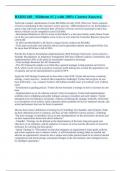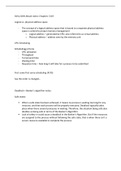BADM 449 - Midterm #1 || with 100% Correct Answers.
Tesla had a market capitalization of some $60 billion in early 2019. What was Tesla's sequence
of moves contributing to this outcome? correct answers - 2008 introduced 1st car, the Roadster, a
sports coup with faster acceleration than a Porsche or Ferrari; served as prototype to show that
electric vehicles can be competitive (cost $110,000)
- discontinued Roadster in 2012 to focus on the Model S, a four door family sedan; Motor Trend
car of the year and received highest score of any car ever tested by Consumer Reports; base price
of $73,500
- In 2016 unveiled Model 3, all electric compact luxury sedan (cost $35,000)
- Tesla aims to provide zero emission electric power generation options and acquired Solar City
for more than $2 billion in fall of 2016
Provide the Analysis-Formulation-Implementation (AFI) Strategy Framework. correct answers -
Strategic Management: an integrative management field that combines analysis, formulation, and
implementation (AFI) in the quest for sustainable competitive advantage
- Tesla example illustrates the AFI framework
- The AFI framework enables us to think like a general manager to help position our firm for
SCA, which can be viewed as positive economic profit (taking into account the opportunity cost
of capital), and can be operationalized as positive NPV.
Apply the AFI Strategy Framework to show that in late 2018, Twitter did not have a coherent
strategy. correct answers - Analysis (the competitive challenge): Twitter did not grow its user
base sufficiently - e.g., compare Twitter's 330 million monthly users to Facebook' over 2 billion
users.
- Formulation (a guiding policy): Twitter did not formulate a strategy on how to increase its user
base.
- Implementation (a set of coherent actions): From its inception, Twitter had implementation
problems due to infighting and public intrigues among co-founders and early leaders. Twitter
attempted to be everything to everybody, without considering the strategic tradeoffs, which lead
to an incoherent set of actions. Such corporate culture problems led to low employee morale, and
actual performance that was far from its potential.
Discuss three classic definitions of strategy by (i) Schelling; (ii) Chandler; and (3) Quinn. What
do these definitions have in common, and how are they different? correct answers - Schelling:
"The term 'strategy' is intended to focus on the interdependence of the adversaries' decisions and
on their expectations about each other's behavior."
- Chandler: "Strategy can be defined as the determination of the basic long-term goals and
objectives of an enterprise, and the adoption of courses of action and the allocation of resources
necessary for carrying out those goals."
- Quinn: Strategy is: "The pattern or plan that integrates an organization's major goals, policies,
and action sequences into a cohesive whole. A well-formulated strategy helps to marshal and
allocate an organization's resources into a unique and viable posture based on its relative internal
competencies and shortcomings, anticipated changes in the environment, and contingent moves
by intelligent opponents."
,What are some important considerations in strategy in the quest to create, capture, and sustain
competitive advantage? correct answers - Definition: Strategy is the quest to create, capture, and
sustain competitive advantage.
- It is the managers' cognitive maps about how to sustain advantage.
- It is about deciding what to do, and what not to do (i.e., economic tradeoffs are considered;
opportunity cost).
- It has alternatives, consequences, and choices involving substantial resources, typically made
under some level of uncertainty.
- It requires long-term commitments that are not easily reversible.
- It is about being different from your rivals. It combines a set of activities to stake out a unique
positioning.
What are the tradeoffs that firms must consider when seeking a (unique) strategic positioning?
correct answers - Competitive advantage has to come from: performing different activities, or
performing the same activities differently than rivals
- Requires tradeoffs: Nordstrom focuses on differentiation with trained sales-people and luxury
settings, while Walmart's strategic activities strengthen its position as a cost leader
If we consider a firm's sustainable competitive advantage as a function of barriers to imitation by
others, and the firm sustaining its cash flow, then how does this conceptualization of sustainable
competitive advantage relate to Net Present Value (NPV) in corporate finance? correct answers
The Net Present Value (NPV) is the sum of the present value of all future cash flows
Explain the stakeholder view of strategic management. correct answers - "Balancing the
shareholder's expectations of maximum return against other priorities is one of the fundamental
problems confronting corporate management."
- Understanding corporate strategy means understanding the competing value claims of multiple
stakeholders.
- Stakeholders are "the organizations, groups, and individuals that can affect or are affected by a
firm's actions"
Describe Target's stakeholder strategy. correct answers - Target Corporation has numerous
awards that reflect its strong relationship with its stakeholders. It is on lists such as best places to
work, most admired companies, most ethical companies, best in class for corporate governance,
and grassroots innovation. Since its founding, Target has given 5% of its profits to education, the
arts, and social services in communities in which it operates, and it contributed $4 million per
week in 2012.
- To show its commitment to minorities and women, Target launched a program to bring
minority- and women-owned businesses into its supply chain. Volunteerism and corporate giving
strengthen the relationship Target has with its employees, consumers, local communities, and
suppliers. These actions can help Target gain a competitive advantage as a retailer as long as the
benefits Target accrues from its stakeholder strategy exceed the costs of such programs.
Provide the five steps of stakeholder impact analysis. correct answers 1. Who are our
stakeholders?
, 2. What are our stakeholders' interests and claims?
3. What opportunities and threats do our stakeholders present?
4. What economic, legal, ethical, and philanthropic responsibilities do we have to our
stakeholders?
5. What should we do to effectively address the stakeholder concerns?
BP's experience in the Gulf of Mexico shows how not to manage stakeholder relationships
effectively. What were the consequences of poor management? correct answers - did not identify
potential opportunities/threats
- oil spill cleanup cost $14 billion
- 5 million barrels of crude oil released into the Gulf of Mexico (largest environmental disaster in
US history)
- Management repeatedly failed to put a safety culture in place
BP paid over $25 billion to settle claims made against them by small business owners that were
effected (total cost for incident was $60 billion)
- EPA banned BP from any new contracts with the US government
Discuss how Merck showed effective stakeholder management in the case of "river blindness."
correct answers - Vision: "to preserve and improve human life"
- Values: "We try to never forget that medicine is for the people. It is not for profits. The profits
follow, and if we have remembered that, they have never failed to appear"
- Merck donated Mectizan in remote areas where health services are often not available
- after 25 years and more than 1 billion treatments the disease had effectively been eradicated
Describe the leadership crisis at Facebook correct answers - The End of the Zuckerberg-
Sandberg Era?
- By 2019, Facebook found itself caught in a perfect storm, and many were demanding that
Zuckerberg and Sandberg step down.
- Due to its lenient privacy controls, third parties were able to siphon off the personal data of tens
of millions of Facebook users, and lax data oversight enabled foreign interference during the
2016 U.S. presidential elections. Critics assert that because of its single-minded pursuit of
exponential growth, Facebook's leadership failed to consider the seriousness of negative side
effects on its stakeholders and the firm's reputation.
Describe the mission of Teach for America (TFA) correct answers - Teach for America (TFA) is
a non-profit organization of future leaders that works to ensure that under-privileged youth
obtain an excellent education. TFA members spend two years teaching in economically
disadvantaged communities across the United States.
- A study commissioned by the U.S. Department of Education found that students being taught
by TFA corps. members showed significantly higher achievement, especially in math and
science.
Discuss "defining the business" and the contract between customer-oriented and product-oriented
visions of the firm correct answers - Customer oriented vision defines a business in terms of
providing solutions to customer needs





